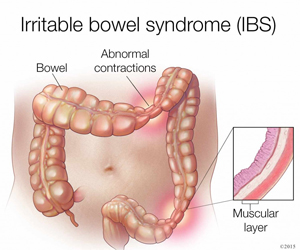Recent Posts
Managing irritable bowel syndrome

Most adults experience occasional constipation, diarrhea, bloating, gas, urgent bowel movements and cramping abdominal pain. However, for some people, these symptoms are a more regular occurrence affecting their quality of life and daily routine. Unfortunately, many of these individuals have what is known as irritable bowel syndrome (IBS) yet don’t know it because they’ve never received an evaluation or diagnosis.
Often, people feel embarrassed discussing the symptoms of IBS with their medical provider. While as many as one in five American adults have signs and symptoms of IBS, fewer than one in five who has these symptoms seeks medical help. For most people, IBS is a chronic condition, which can fluctuate from producing mild to severe symptoms — and sometimes symptoms disappear completely.
Impact and triggers
The impact of IBS and the way it manifests varies from person to person. Oftentimes, stimuli that fail to bother certain people may in turn trigger symptoms in others with IBS. For example, certain foods, emotional stress, hormones and other illnesses can all incite the symptoms of IBS.
Risk and susceptibility
While IBS can affect almost anyone, certain risk factors do exist, including people who are:
- Young
- Female
- Have a family history of IBS
- Have a history of anxiety or depression
It’s distinctly less common to have IBS as the cause of your symptoms if the onset of your symptoms occurs after the age of 50 or if you’re experiencing the symptoms at night during normal sleeping hours. These and other signs, such as blood with bowel movements, unintentional weight loss, fevers, nausea with recurrent vomiting and abdominal pain that is unrelieved by having a bowel movement, require further evaluation by a medical professional.
It’s best to seek the advice and expertise of a medical professional if you experience symptoms suggestive of IBS. Importantly, serious conditions can initially appear with the same set of symptoms as IBS. A healthcare provider will help sort out these possibilities. Start with your primary care provider, who may then refer you to another provider with special expertise in IBS.
If your symptoms fit the typical IBS criteria and you’re not displaying more worrisome signs or symptoms, your doctor may suggest a course of treatment without requiring additional testing. But if you don't respond to that treatment, you may still require additional testing.
Causes
Currently, there’s no cure for IBS, but medical experts know IBS doesn’t result in permanent harm to the intestines and doesn’t cause cancer. Because it's not clear what causes IBS, current treatment focuses on the relief of symptoms so you can live as normally as possible. In most cases, you can successfully control mild symptoms of IBS by learning to manage stress and making healthy changes to your diet and lifestyle. This includes exercising regularly, drinking plenty of fluids and getting enough sleep. Your healthcare provider may prescribe other specific dietary changes, medications and supplementary treatments.
Support
While living with IBS can present daily challenges, your healthcare team is available to help. They can guide you through appropriate evaluation of your symptoms and provide treatments to assist you in optimizing your quality of life. In addition, consider talking with other IBS sufferers or looking for local and online IBS support groups to help you cope with and manage your condition.
By Mayo Clinic Health System staff





